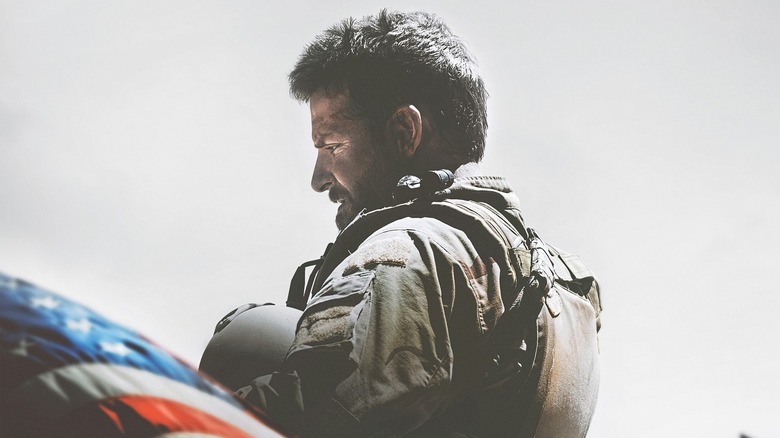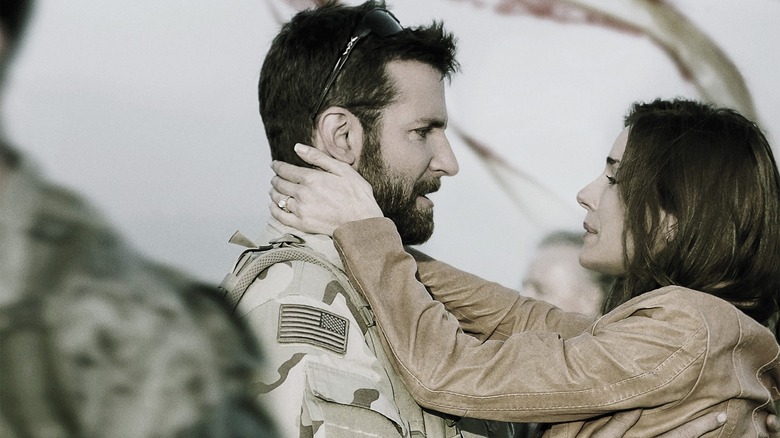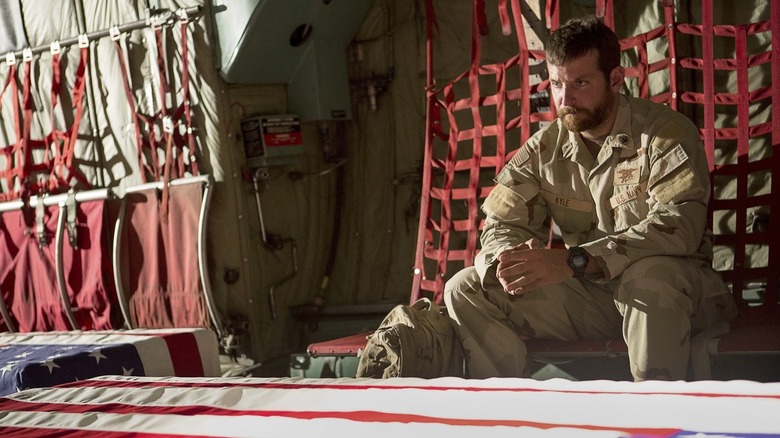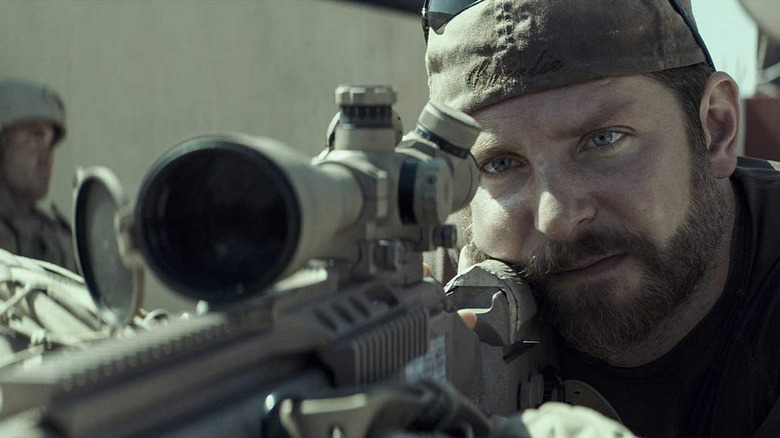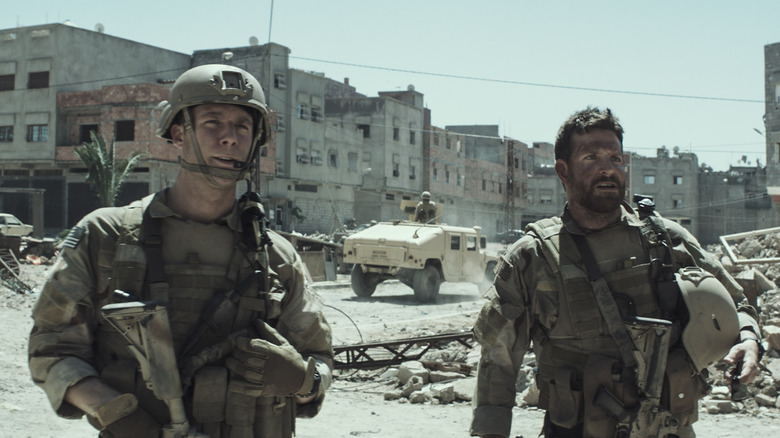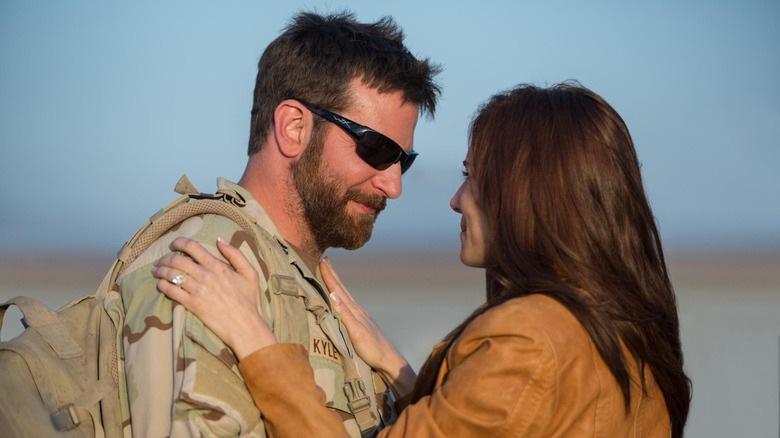How American Sniper Became The Biggest January Movie Ever At The Box Office
(Welcome to Tales from the Box Office, our column that examines box office miracles, disasters, and everything in between, as well as what we can learn from them.)
"When I die, God is going to hold me accountable for everything I've done on earth. He may hold me back until last and run everybody else through the line, because it will take so long to go over all my sins." Those are the words of Chris Kyle, the man who holds the distinction of being the most lethal sniper in the history of the U.S. Military. Kyle penned a book about his four tours in Iraq titled "American Sniper," and it would go on to inspire a movie that shattered decades-long beliefs about what a movie could do at the box office in January. Kyle wouldn't live to see his movie make it across the finish line, nor would he be there to weigh in on the complicated legacy it left behind.
The 2014 film focuses on U.S. Navy SEAL sniper Chris Kyle, who is sent to Iraq to protect his brothers-in-arms. Kyle was incredibly accurate (and deadly), both taking many lives and saving countless lives on the battlefield. As stories of his exploits spread, he earned the nickname "Legend." But that very reputation also grew behind enemy lines, resulting in a price on his head that makes him a prime target. Cooper and Eastwood used cinema to present him as a true American hero — and audiences ate it up, even if the truth was skewed by the presentation.
In this week's Tales from the Box Office, we're looking back at "American Sniper," how Bradley Cooper championed the movie every step of the way, how Clint Eastwood wound up in the director's chair, what happened when the movie hit theaters, the controversy that sprang up in the middle of the theatrical run, and what lessons we can learn from it nearly a decade later. Let's dig in, shall we?
The movie: American Sniper
After starring in hits like "The Hangover" trilogy, Cooper began taking more control over the direction of his career by producing. He formed his own production company, 22nd & Indiana, and set up his first project at Warner Bros. as a producer in 2012 in the form of an adaptation of "American Sniper," which had spent weeks on the New York Times best-seller list. A tale of a modern war hero with the hook of "the most lethal sniper in U.S. history" felt destined for the silver screen.
Several A-list directors circled the film, including David O'Russell ("American Hustle") at one point. Steven Spielberg ("Saving Private Ryan") was even announced to direct in May 2013, but that didn't pan out. "It was a psychological duel as much as a physical duel. It was buried in my script, but Steven helped bring it out," screenwriter Jason Hall ("Paranoia") said of Spielberg's version. Spielberg's idea was to focus a great deal on an enemy sniper who has it out for Kyle nearly as much as Kyle himself.
That didn't gel with the studio, so they brought in another legend to tell Kyle's tale: Clint Eastwood. What wasn't set in stone at first was Cooper's participation as the actor who would portray Kyle. Cooper explained to the Los Angeles Times in December 2014 that he signed on so that Warner Bros. would agree to make the movie.
"At that time [before Kyle died] I felt I wasn't right for the role. Look at me, I'm from Philadelphia, I weigh 185 pounds. He was a huge [guy] from Texas. I thought maybe Chris Pratt. But in order to get WB to buy, I had to agree to star. I loved the story, though."
American Sniper loses its hero
The studio might have felt differently if they had known Pratt would become a bona fide movie star when Marvel's "Guardians of the Galaxy" arrived in 2014, or that he would star in one of the biggest films of all time in the summer of 2015 when "Jurassic World" came out. But at that time, Cooper was the safer bet.
As for Kyle, the veteran was killed by a former Marine, Eddie Ray Routh, at a shooting range in Texas in 2013. This, naturally, changed the direction of the project. "The gears just went off for a second," Cooper said in that same 2014 LA Times interview. "Everything just kind of stopped. Your brain takes in the information, but your body hasn't quite caught up. Chris and I, we're the same age, the same height, the same shoe size. You're just reminded anything's possible in life."
Despite the tragedy, the film pressed on with Chris Kyle's widow, Taya Kyle (played by Sienna Miller), working closely with the filmmakers on the story. But it was Cooper who was at the top of the food chain, both as lead actor and producer, shepherding the project along every step of the way. "Bradley was engaged in all aspects of the film and has an unparalleled work ethic and concentration level," Eastwood told the Los Angeles Times in February 2015. "He was very invested in the overall project, as I was when I was young. Being interested in every detail is what drove me to want to direct, and I would not be surprised to see Bradley wanting to direct in the future."
As it happens, Cooper would go on to direct 2018's "A Star is Born" remake, which was itself a massive hit and an Oscar-winner. And Cooper is once again in the midst of the Oscar race with his latest film "Maestro." Eastwood was very much correct in his assessment.
'Medals never tell the whole story'
"I'm proud of my service, but I sure as hell didn't do it for any medal. They don't make me any better or less than any other guy who served. Medals never tell the whole story," Kyle said in his memoir. That proved to be very true. The medals were just part of his story, with an emphasis on "story."
Kyle has been accused of telling half-truths and lies after his death. He reportedly embellished his military record, claiming he had earned more stars of valor than he in truth did. Kyle also reportedly lied about killing looters during Hurricane Katrina and finding chemical weapons in Iraq, among other things. The myth that Kyle built up for himself was not built on hard, unimpeachable facts. Despite that, Eastwood, Hall, and Cooper decided to lean on an uncritical hero narrative.
"American Sniper," as a film, is also very uninterested in the "why" of the war in Iraq. That could be written off as a filmmaking choice by Eastwood. But there was a sense from many observers that the sheer unwillingness to address the politics around the war and make it a pure hero story was problematic. "It's a movie that's going to leave viewers with a false perception of what happened," Vox mused in January 2015.
Problematic elements aside, "American Sniper" arrived at the precise right time. Even though the war in Iraq was a questionable one in the eyes of many Americans (and those around the world), audiences were very much ready to embrace this hero tale. In part because it offered blockbuster entertainment with zero competition to challenge it in the space. The barren wasteland that is January provided a clear path for this film to shatter box office records.
The financial journey
Warner Bros. knew it had an Oscar contender on its hands, and gave "American Sniper" a limited release in just four theaters beginning on Christmas Day in 2014. The film posted ridiculous per-screen averages in the $150,000 range for three weekends before finally opening wide on January 16. Even though it wasn't technically a January release, it was about to demolish records for the month, putting up numbers the industry previously thought to be impossible.
Opening against Paul King's beloved "Paddington" and Kevin Hart's "The Wedding Ringer," Eastwood's wartime biopic easily steamrolled the competition, posting a ridiculous $89.2 million on its first weekend in wide release. When accounting for the MLK Monday holiday, that total ballooned to $107.2 million. It was then and remains now the biggest January weekend at the box office. In the coming weeks, the film held its ground as movies like "The Boy Next Door," and "Project Almanac" failed to take the top spot.
"American Sniper" — aided by stellar word of mouth from moviegoers — finished its run with $350.1 million domestically, making it the biggest domestic earner released in 2014. It also pulled in a huge $197.5 million overseas for a grand total of $547.6 million worldwide. At the time, that made it the highest-grossing war movie ever, passing Steven Spielberg's "Saving Private Ryan" ($481 million worldwide). It also still ranks as Eastwood's biggest movie ever, which is no small thing.
It has since been passed by several Chinese war films like "The Battle of Lake Changjin" ($902 million), as well as Christopher Nolan's "Oppenheimer" ($953 million) this year — but that's more of a biopic with a WWII backdrop. Eastwood made a pure, modern war movie that massively resonated with audiences. Even so, due to some of the aforementioned criticisms, the movie's legacy became instantly complicated.
A movie 'almost too dumb to criticize'
"Trying to make a typically Hollywoodian one-note fairy tale set in the middle of the insane moral morass that is/was the Iraq occupation is both dumber and more arrogant than anything George Bush or even Dick Cheney ever tried," Matt Taibbi wrote of the film for Rolling Stone in January 2015, in a piece titled "American Sniper is Almost Too Dumb to Criticize." The writer added, "The fact that the movie is popular, and actually makes sense to so many people, that's the problem."
The moviegoing public loved "American Sniper" — as did a great many critics (you can read /Film's 7 out of 10 review of the film here). It was also nominated for Best Picture at the Oscars. So we can't pretend that it didn't resonate with people. But the people who disliked the movie didn't just dislike it; they actively took issue with it.
This is to say nothing of the whole "fake baby" scene in the film. That whole fiasco could, itself, warrant an in-depth dissection. Another time, perhaps. The fact of the matter is that Eastwood and Cooper had a story they wanted to tell. Right or wrong, that version of the story colored the truth. And because most people were only going to see the movie and not look into the real story beyond that, the movie has a lot of power in coloring the truth.
"The biggest antiwar statement any film can make is to show the fact of what [war] does to the family and the people who have to go back into civilian life like Chris Kyle did," Eastwood said in January 2015 at the Producers Guild Award Nominees Breakfast, indirectly responding to the criticism. "In World War II, everybody just sort of went home and got over it. Now there is some effort to help people through it. In Chris Kyle's case no good dead went unpunished," the filmmaker added.
The lessons contained within
As we stare down the barrel of the 2024 release calendar, it's tough not to think about "American Sniper" from a purely commercial standpoint. Due to the WGA and SAG-AFTRA strikes, many films were pushed to 2025 or delayed to much later in the year. January could use a breakout hit like this to help keep theaters on their feet. Sadly, nothing coming down the pipeline appears to have this sort of gas in the tank. Who knows? Maybe Jason Statham's "The Beekeeper" can become the next "John Wick" (though I kindly doubt it).
January shouldn't be a dumping ground going forward. It's the month that also gave us "Taken." It's the month that allowed "Avatar" to become the highest-grossing movie in history. Audiences will go to the movies when properly motivated to do so. Why not give them better reasons to do just that in the early part of the year?
Looking at the admittedly tricky legacy of "American Sniper," there is much to consider. Movies are artistic interpretations even when they are based in truth. "Steve Jobs" doesn't at all resemble the man's life, but it seeks to paint a portrait of who he was. "Titanic" uses fictional characters to offer a POV look at a historical tragedy. "American Sniper" chooses to focus on Chris Kyle, the hero, rather than Chris Kyle, the complex embodiment of the tragedies of war. At the end of the day, it's difficult to argue against the results from Warner Bros.' standpoint.
Whether you love "American Sniper" or hate it, it exists as both an intimate, imperfect depiction of war and a remarkable example of a movie connecting with mass audiences in a way cinema rarely does. Success in the realm of art supported by commerce does not often result in an unassailable piece of work.
